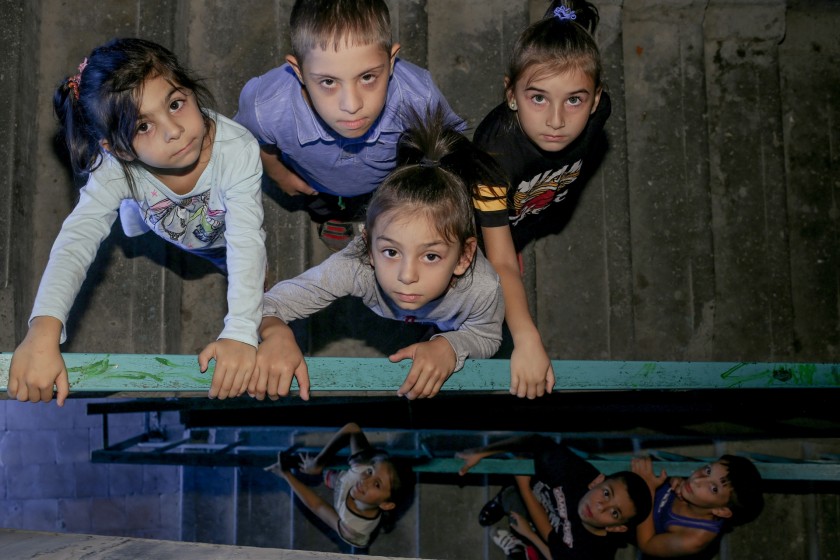
Yerevan’s Alternate Universe: Residents of Mars
Marine Martirosyan
There’s a blacktop road that starts at an intersection along Gousan Sheram Street in Yerevan’s Malatia-Sebastia District.
It leads to an alternate reality few visitors to the capital of Armenia ever see.
There are a few private houses along the road before it reaches the aptly named Mars Electronics Factory – a Soviet-era giant that now uses a small part of its potential.
Once past the factory, a visitor sees a desert-like vista. The sun has baked the grass brown. Rusting pieces of scrap metal – old stoves, equipment and cars – line the street. It’s an inhospitable setting. You’d think no one lives here, but you’d be wrong.
Clotheslines full of colorful laundry remind the visitor that people call this place home.

Residents of the building say it used to house the fire brigade for the factory, once famous for producing robotic equipment. People moved into the building in the late 1990s.
Sargis Iskandaryan says his family was one of the first. He says there was no water, electricity or sewage service back then and that residents installed everything on their own.
Tamara Haroutyunyan’s family moved here in 2001. For one year, they lived without windows, water and sewage. They now have electricity, but Tamara says the wiring is so bad they’re afraid to plug in any devices.

Exposed wires can be seen hanging in the stairwells.

“The drains are in bad shape. There’s a young guy in the building who’s fixed the shower drain. Conditions here are poor. It’s like living in the stone age,” Tamara says.
41 families live in the building, and residents say none are economically secure. They get by working as cleaning attendants, scrubbing toilets and washing dishes. Some problems, however, are too big for them to handle on their own.

Residents say that if a family receives a donation of clothing, they’ll share it with neighbors. Sharing is a way of life for residents.
Anahit Manoukyan has worked for 25 years at the Kilikia Beer Factory. She says that because of the roaming packs of wild dogs, she takes bread with her every morning on her one kilometer walk to the nearest bus station to feed the ravenous beasts. So far, they haven’t attacked her.
“We have a shower but it’s always backing up. I bathe at work,” the irate resident says, adding that the kids are bathed standing in a basin in the apartment.

Anahit talks about the vermin and scorpions that infest the building. “I’ve put rat poison in every corner to keep them from walking over us,” she exclaims.
Kristineh Karapetyan, another building resident, minces no words when describing the situation.
“The building’s in bad shape. Conditions are intolerable. Even dogs don’t live like this. What is this government thinking?” Karapetyan says, adding that suitors would never look for a bride here.
Residents claim that they’ve contacted the Malatia-Sebastia District Council on several occasions, but that nothing has been done.
  |
Karapetyan says that council officials visited the building a few days before the Hetq team showed up.
“They inspected three apartments, including mine, and took notes. They wanted to know how many children I had, if I was married, and if I worked. Then, they entered my neighbor’s apartment, with the crumbling walls. Spotting a television, they said, ‘Isn’t that great, you have a TV’. The place is falling apart. So what’s the big deal of having a TV? I have no clue what they were looking for,” says Karapetyan.
She says that officials visit whenever elections are being held, but that the candidates never fulfill their campaign promises.
“We’ve always voted for the Republican Party guys. Let them come and help us,” Karapetyan says.

Hetq wrote to the Yerevan Municipality, asking if there was anything official regarding the building’s risk of collapsing or if there was any plan to relocate the residents. We also wanted to know if the apartments could be handed over to residents as private property.
The municipality responded that there was no official conclusion regarding the safety status of the building at 111 Raffi Street, and thus, it was not on the list for future reinforcement or demolition.
The building is still registered as belonging to RAO Mars CJSC, the company that ran the factory.
Residents would like to see the apartments allocated to them as owners. They’re afraid that one day they’ll be evicted and wind up living on the street.
Photo and video: Davit Banuchyan
 Videos
Videos Photos
Photos




Write a comment